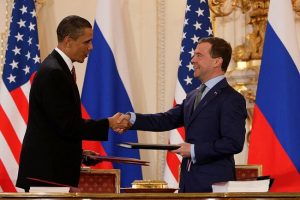Approximately four months from now, the U.S.-Russia arms control regime the world has relied on for nearly a half-century could be over. Nuclear negotiations between U.S. and Russian officials are mired in confusion, with the chief U.S. and Russian arms control envoys offering completely divergent interpretations of where the process is. On October 20, a senior U.S. official suggested that a deal with Russia was within reach, although technical issues such as verification have yet to be resolved.
For the United States, the list of options is shrinking. It is unreasonable to hash out a brand new arms control agreement with Russia in just four months, particularly when U.S.-Russia relations are already enveloped with distrust and hostility. The only option available at this late stage in the game is to sign to extend what we already have: New START.
The treaty faces an uncertain fate. New START is a bilateral accord negotiated nearly a decade ago that caps the number of deployed U.S. and Russian strategic nuclear warheads to 1,550 on deployed ICBMs, SLBMs, and heavy bombers. Critically, New START provides the world’s two nuclear superpowers with the ability to ensure the limitations of the agreement are being implemented. Through a system of mutual, on-the-ground inspections and information exchanges, both countries have been able to operate with a sense of confidence that neither is cheating.
The Trump administration, however, has never been especially supportive of the Obama-era accord. President Donald Trump blasted the agreement during his first phone call with Russian President Vladimir Putin, calling it a bad deal for the United States. Long before he was tapped as national security adviser, John Bolton argued the pact gutted Washington’s nuclear flexibility. While there was an implicit understanding that preventing a nuclear arms race was a noble objective, there was also a strong, underlying sentiment in the administration that Moscow was a serial arms control violator that needed to be held to account.
This assessment was not entirely wrong — Moscow did breach the terms of the Cold War-era Intermediate Range Nuclear Forces Treaty (INF) by deploying a treaty-busting ground-launched missile system. But the U.S. State Department continues to certify Moscow’s compliance with New START, demonstrating just how valuable an arms control regime can be in limiting Moscow’s deployed nuclear arsenal.
For Washington, however, merely extending New START for another five years is insufficient. Trump administration officials have strongly pushed for a more comprehensive accounting of Russia’s nuclear weapons stockpile and insist that China must eventually be involved. China’s inclusion in a strategic dialogue is of course understandable; the Pentagon calculates that Beijing could double its nuclear warhead stockpile over the next decade and is close to fielding its own nuclear triad.
Yet from the standpoint of the Chinese, participating in a trilateral arms control negotiation with the U.S. and Russia is a foolish proposition. At roughly 320 warheads, or even fewer, China’s inventory is peanuts compared to what the U.S. (5,800) and Russia (6,370) bring to the table. As a senior Chinese arms control official reiterated in July, “China has made its position [on trilateral arms control] known on numerous occasions.” The answer: We aren’t interested, so stop asking.
After waiting years before showing any interest whatsoever in arms control talks, Washington is now scrambling to sign a deal with Moscow before the U.S. election in November. The only problem, of course, is that arriving at an agreement typically takes time and multiple rounds of painstaking, highly technical negotiations. New START was the product of a year of talks between U.S. and Russian officials before Presidents Obama and Medvedev celebrated with a signing ceremony. The INF Treaty was inked in December 1987, but only after three years of arduous give-and-take. In waiting so long and attaching unrealistic conditions to the signing of a new accord, the administration has backed itself into a corner as the clock ticks — so much so that the White House has asked U.S. Strategic Command to assess how much time is needed to pull nuclear warheads out of storage and mate them onto bombers, submarines, and land-based missiles in the event New START expires.
To be fair, the Trump administration deserves credit for slowly evolving its position to more realistic terrain. In August, the White House dropped the link between China’s participation and a New START extension, removing a major roadblock in the process. But Washington is still pushing Moscow to agree to a freeze on its entire nuclear weapons arsenal, including its advantage in tactical nuclear warheads. The Russians are highly unlikely to accept this condition so long as Washington refuses to put U.S. missile defense systems on the table for discussion.
Diplomacy is the art of the possible. Sitting here today, with the last nuclear guardrail at risk of disappearing, negotiating something from scratch is not in the cards. Keeping New START alive would preserve the limitations and transparency that would otherwise be lost, help prevent the U.S.-Russia relationship goes over the cliff, stop a 21st century arms race between two powers who already possess 90 percent of the world’s nuclear arsenal, and put more time on the clock so both states can explore whether more groundbreaking opportunities are possible.
Maintaining strategic stability with the world’s major powers is a critical ingredient in formulating an effective and restrained U.S. foreign policy — even more so in an international environment dominated by great power competition. The more U.S. officials dither, the harder it will be for the U.S. to manage that competition.
Daniel R. DePetris is a fellow at Defense Priorities and a columnist at the Washington Examiner.

































